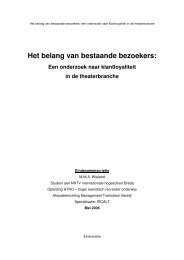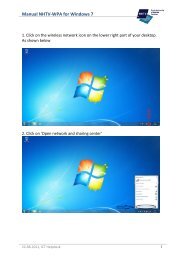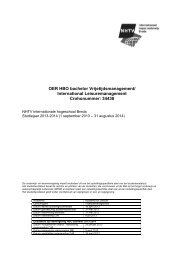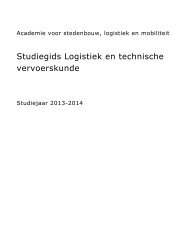Study Manual International Logistics And Transport ... - Nhtv
Study Manual International Logistics And Transport ... - Nhtv
Study Manual International Logistics And Transport ... - Nhtv
You also want an ePaper? Increase the reach of your titles
YUMPU automatically turns print PDFs into web optimized ePapers that Google loves.
OSIRIS code:<br />
Course name:<br />
<strong>Study</strong> programme(s):<br />
Education:<br />
<strong>Study</strong> load:<br />
Lecturer(s):<br />
Learning objective(s):<br />
Content description:<br />
Language:<br />
Teaching activity:<br />
BIP1.LAW-01C<br />
Basic principles of law<br />
☒ILE ☒ILT ☐ITR ☐LE ☐LTV ☐MOB ☐RO ☐UD<br />
course<br />
2 EC (= 56 hours)<br />
Simonne Edelhauser<br />
As a result of the course you should be able to master the basic<br />
technical legal jargon and the basic principles of international law in<br />
order to analyze simple general judicial cases.<br />
This course contains:<br />
- an explanatory introduction to comprehend the international judicial<br />
systems in the western world and the general technical basic jargon,<br />
basic concepts and the relevance of law in society;<br />
- an introduction in the various sources of law (from legislation to case<br />
law), including the connections between these sources;<br />
- transfer of knowledge of the tasks of various international and national<br />
legislators in the western world, the different ways legislation is created<br />
and can occur and legislative paths of Central, Federal and Local<br />
Powers (including the hierarchy in legislation);<br />
- basics to enable you to distinguish between the various ways of<br />
organizing law (national/international law, private/public law,<br />
substantive/procedural law, fields of law, remaining classifications);<br />
- theory and cases to enable you to understand the meaning of, and the<br />
differences between, the fields of law: Constitutional, Administrative,<br />
Penal and Civil law;<br />
- theory and cases to acquire knowledge of the differences and Legal<br />
effects between substantive and procedural law;<br />
- theory and cases to acquire understanding in the difference between<br />
imperative and supplementary law;<br />
- the way a law suit (in civil, penal and administrative law) is carried out<br />
in practice and the ways of executing sentences and verdicts of the<br />
judiciary, including the tasks and competences of the Magistrature (the<br />
court and Public Prosecutor), attorneys at law and lawyers and Process<br />
servers.<br />
- European law: the meaning and scope of European law, including the<br />
difference in legal force of regulations and directives within European<br />
Law and the basic principles of providing for European law;<br />
- Private law: - the most basic rules to reach an agreement (from offer to<br />
agreement);<br />
- the basic rules of default and tort;<br />
- the difference between rules concerning valuables/property and other<br />
rules in civil law;<br />
- the characteristics of collateral rights (mortgage and lien) and the<br />
different ways the law treats movable and immovable goods;<br />
- the ways to obtain ownership of movable and immovable goods,<br />
including acquisitive and extinctive prescription. If possible case law will<br />
be provided.<br />
EN<br />
lecture<br />
19

















